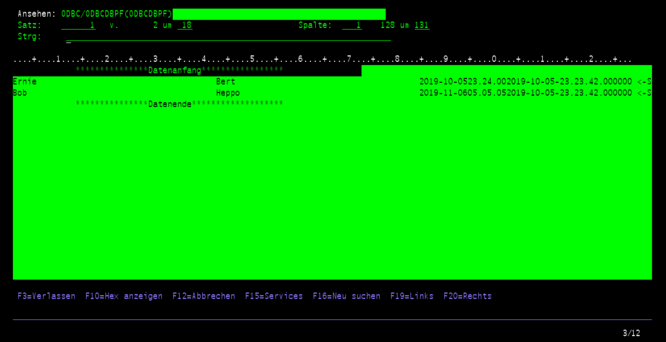Query database using ODBC from a linux machine
Accessing a AS/400 via ODBC is something that might come in handy some day, so I decided to explore how it can be done.
Be warned: This is more like a log, showing (and hopefully solving) all issues I ran into doing this. I think this is more helpful than a ideal world example.
Create a database
I suggest you try Beginners Project: 99 Bottles Of Beer (using REXX) and Beginners Project: Hello World (using database, display file and RPG) before you try this![1]
Create a database to play with
- This is the third project Heiko did, so his personal Library was getting a bit cluttered. Therefore, let's create a library just for this niew project:
CRTLIB LIB(ODBC) TEXT(Library for ODBC project source)
CRTSRCPF FILE(ODBC/ODBCDB) RCDLEN(112) TEXT('Project ODBC and Database')to create new physical file to hold the DDS.WRKMBRPDM FILE(ODBC/ODBCDB)Work with this file.F6to create new member, insert member's name (ODBCDBPF) and the typePF: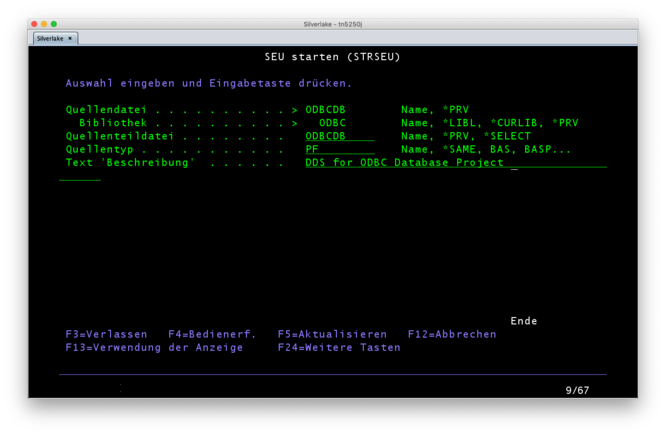
- Enter this DDS: (Learn what the below means Especially time- and dateformats Even more about wibbly-wobbly-timey-wimey-stuff and more)
***************** Datenanfang *******************************************************************************************
0001.00 A R CALLS 191002
0002.00 A CALLER 42A 191002
0003.00 A CALLED 42A 191002
0004.00 A DATE L TIMFMT(*ISO) 191002
0005.00 A TIME T 191002
0006.00 A TIMESTAMP Z 191002
******************Datenende *********************************************************************************************
14to compile…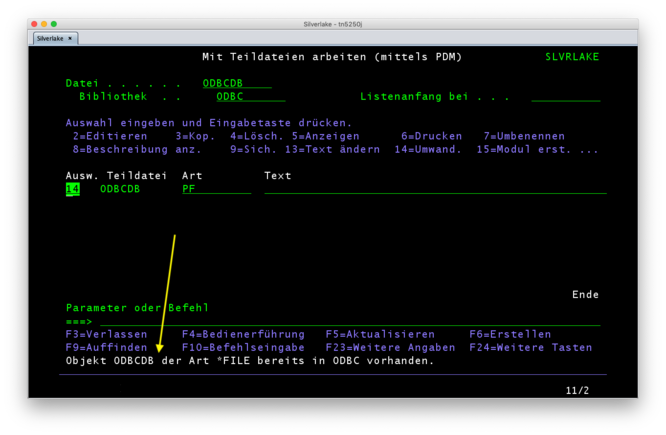
…I failed again. Stupid me. I can't create a new physical database file in the same place, where source physical file (with the same name!) exists.- Just rename the DDS member from
ODBCDBtoODBCDBPF: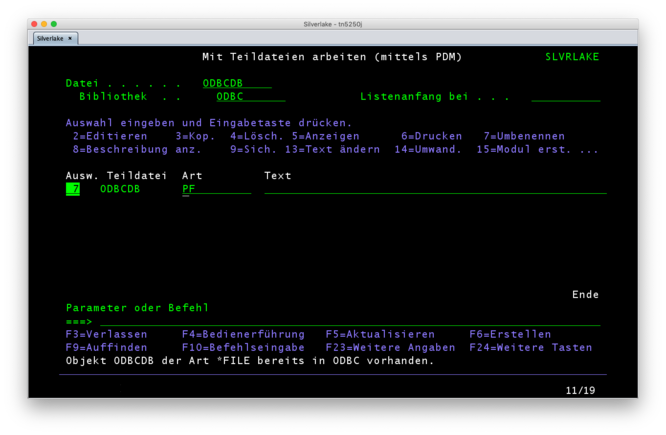
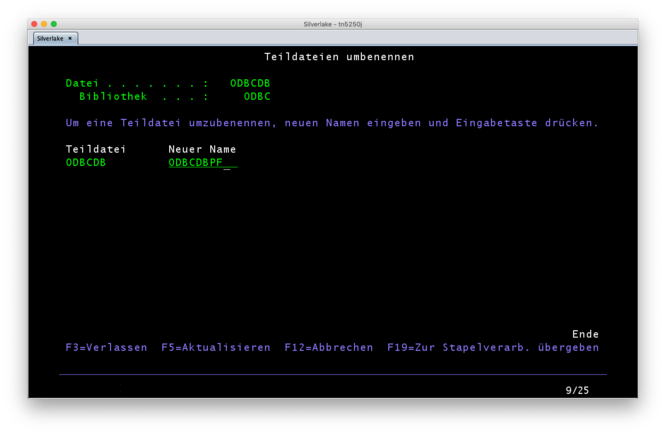
- And try again.
- Check with
DSPMSG[2] whether the compile was successful or not. If it did, you find the new PF in the library: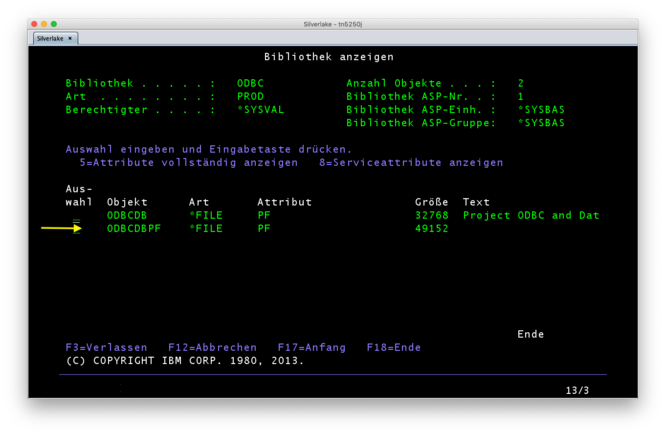
- Just rename the DDS member from
Insert content into the database
STRSQL+F4- Enter the library name, in this example
ODBC[3]
- Enter the library name, in this example
- In the interactive SQL session, enter:
INSERT INTO CALLS (CALLER, CALLED, DATE, TIME, TIMESTAMP) VALUES ('Ernie', 'Bert', '2019-10-05', '23.23', '2019-10-05 23:23:42')[4][5] - There are many ways to display the result:
- If you're still in STRSQL, enter:
SELECT * FROM CALLS - On command line, try this:
DSPF FILE(ODBC/ODBCDBPF) - Or use
STRDFU, select option 5 and fill out the displayed form.
- If you're still in STRSQL, enter:
ODBC Queries
Make sure you've set up your ODBC connection (/etc/odbc.ini) correctly.
Perl
Here is a nice HowTo from IBM. Worth reading.
Script Source Code
#!/usr/bin/perl
use strict;
use DBI;
my $db_cfg="YOURCONFIG"; # See your /etc/odbc.ini
my $db_pwd="YOURUSER";
my $db_user="YOURPASSWORD";
printf("Connecting to source database on $db_cfg...\n");
my $dbh = DBI->connect('DBI:ODBC:' . $db_cfg, $db_user, $db_pwd, {PrintError => 1, AutoCommit => 1}); # Connecting to Db2 database
if ( $dbh )
{
my $sth = $dbh->prepare ("SELECT * FROM ODBC/ODBCDBPF");
if (!$sth->execute)
{
printf("Error: Preparing select on source failed.\n");
die;
}
my $fCaller;
my $fCalled;
my $fDate;
my $fTime;
my $fTS;
while ( ($fCaller, $fCalled, $fDate, $fTime, $fTS) = $sth->fetchrow ) # Read one row from source table
{
printf("%s, %s, %s, %s, %s\n", $fCaller, $fCalled, $fDate, $fTime, $fTS);
}
# Clean up last statements
$sth->finish;
# Disconnect from database
if ( $dbh )
{
print("Disconnecting from $db_cfg...\n");
$dbh->disconnect;
}
}
else
{
printf("Error: Connection to database (%s) failed:\n%s\n%s\n%s\n", $db_cfg, $DBI::err, $DBI::errstr, $DBI::state);
die;
}
Output
$ ./as400-odbc.pl Connecting to source database on YOURCONFIG... Ernie Bert 2019-10-05 23:24:00 2019-10-05 23:23:42.000000 Bob Heppo 2019-11-06 05:05:05 2019-10-05 23:23:42.000000 Disconnecting from YOURCONFIG...
PHP
I found several possible approaches:
- Use
odbc_command set - Use PDO
- Short Overview @PoC: Is this compatible???
- Use Db2 driver @PoC: Is this compatible???
- Db2 client & direct link
- Installation instructions
- Usage and after client installation:
TBD -hmight help!
PHP Code using ODBC
Let me say right away, that didn't work out as easy as I hoped.
<?php /* Sample Code: How to query a Db2 database on a AS/400 (iSeries) * Note: apt-get install php-odbc might be necessary * About: https://try-as400.pocnet.net * */ $db_cfg="YOURCONFIG"; # See your /etc/odbc.ini $db_user="YOURUSER"; $db_pwd="YOURPASSWORD"; $dbh=odbc_connect($db_cfg, $db_user, $db_pwd); if ($dbh) { $sql="SELECT * FROM ODBC/ODBCDBPF"; printf("Preparing \"$sql\"...\n"); $sth=odbc_prepare($dbh, $sql);
As you can see, the source isn't complete. That's because I wasn't able to execute it any further. Output so far:
Preparing "SELECT * FROM ODBC/ODBCDBPF"... mmap() failed: [12] Cannot allocate memory PHP Fatal error: Out of memory (allocated 2097152) (tried to allocate 206158430251 bytes)
The driver seems to need 206158430251 bytes, that's 192GB, a bit greedy for my taste.
After some research[7][8][9]I'm pretty sure, its old 32bit ODBC-drivers conflicting with 64bit PHP[10].
STAY TUNED WE ARE WORKING ON A SOLUTION.
PHP Code using DB2 client
That wasn't very smooth, either.
I first installed some software:
- Get IBM's CLI driver: https://public.dhe.ibm.com/ibmdl/export/pub/software/data/db2/drivers/odbc_cli/ and move it to /home/clidriver
- Insert this into .bashrc:
# CLI Driver (PHP -> Db2 (AS/400),
export IBM_DB_HOME=/home/clidriver
export LD_LIBRARY_PATH=${IBM_DB_HOME}/lib
export PATH=${IBM_DB_HOME}/bin:$PATH
- apt-get install php-dev
- pecl install ibm_db2
- add extension=ibm_db2.so to /etc/php/7.0/cli/php.ini
- If used with apache (untested):
- add LD_LIBRARY_PATH as shown above to httpd.conf
- add extension=ibm_db2.so to /etc/php/7.0/apache2/php.ini
- Beyond: https://www.php.net/manual/en/ibm-db2.installation.php || https://github.com/php/pecl-database-ibm_db2 || https://public.dhe.ibm.com/ibmdl/export/pub/software/data/db2/drivers/odbc_cli/
$db_user="YOURUSER"; $db_pwd="YOURPASSWORT"; $db_db = 'ODBC'; $db_hostname = 'silverlake.intern.mathpeter.com'; $db_port = 8471; //50000; /* https://www.ibm.com/support/pages/tcpip-ports-required-ibm-i-access-and-related-functions */ $db_options = array('autocommit' => DB2_AUTOCOMMIT_ON); ini_set("display_errors", 1); //$connectionString = "DRIVER={IBM DB2 ODBC DRIVER};DATABASE=$db_db;HOSTNAME=$db_hostname;PORT=$db_port;PROTOCOL=TCPIP;UID=$db_user;PWD=$db_pwd;"; // takes for ever to connect $connectionString = "DATABASE=$db_db;HOSTNAME=$db_hostname;PORT=$db_port;PROTOCOL=TCPIP;UID=$db_user;PWD=$db_pwd;"; // takes for ever to connect printf("connectionString: $connectionString\n"); $dbh=db2_connect($connectionString, NULL, NULL, $db_options); // https://www.php.net/manual/en/function.db2-connect.php
This code stalls at db2_connect(). netstat shows that the TCP-connection is ESTABLISHED. It doesn't create heavy load or traffic. It doesn't run into a timeout.
STAY TUNED - MAYBE I CAN GET THIS WORKING.
PHP Code using PDO
TBD
C
Nice to know:
- http://www.unixodbc.org
- http://www.unixodbc.org/doc/db2.html
- https://www.easysoft.com/developer/interfaces/odbc/linux.html
- https://www.easysoft.com/developer/languages/c/odbc_tutorial.html
- https://stackoverflow.com/questions/33020646/gcc-odbc-on-linux-is-not-linking
- You might need to install unixodbc-dev
C Source Code
/* File: as400-odbc.c * About: Learn more here: https://try-as400.pocnet.net */ #include <stdio.h> #include <stdlib.h> #include <sql.h> #include <sqlext.h> #include <string.h> #define RESULT_LEN 256 char *odbcConnectionString = "DSN=YOURCONFIG;UID=YOURLOGIN;PWD=YOURPASSWORD;"; // See /etc/odbc.ini for DSN, use your AS/400 account as credentials. #define CHECK_ERROR(e, s, h, t)\ (\ {\ if (e!=SQL_SUCCESS && e != SQL_SUCCESS_WITH_INFO)\ { extract_error(s, h, t); goto exit;}\ }\ ) void extract_error(char *fn, SQLHANDLE handle, SQLSMALLINT type) { SQLINTEGER i = 0; SQLINTEGER NativeError; SQLCHAR SQLState[7]; SQLCHAR MessageText[256]; SQLSMALLINT TextLength; SQLRETURN ret; fprintf(stderr, "\nThe driver reported the following error %s\n", fn); do { ret = SQLGetDiagRec(type, handle, ++i, SQLState, &NativeError, MessageText, sizeof(MessageText), &TextLength); if (SQL_SUCCEEDED(ret)) { printf("%s:%ld:%ld:%s\n", SQLState, (long)i, (long)NativeError, MessageText); } } while (ret == SQL_SUCCESS); } int main() { SQLHENV henv = SQL_NULL_HENV; // Environment SQLHDBC hdbc = SQL_NULL_HDBC; // Connection handle SQLHSTMT hstmt = SQL_NULL_HSTMT; // Statement handle SQLRETURN retcode; SQLCHAR fCaller[RESULT_LEN]; SQLCHAR fCalled[RESULT_LEN]; SQLCHAR fDate[RESULT_LEN]; SQLCHAR fTime[RESULT_LEN]; SQLCHAR fTS[RESULT_LEN]; SQLCHAR outstr[1024]; SQLSMALLINT outstrlen; int i = 0; // Allocate environment handle retcode = SQLAllocHandle(SQL_HANDLE_ENV, SQL_NULL_HANDLE, &henv); CHECK_ERROR(retcode, "SQLAllocHandle(SQL_HANDLE_ENV)", henv, SQL_HANDLE_ENV); // Set the ODBC version environment attribute retcode = SQLSetEnvAttr(henv, SQL_ATTR_ODBC_VERSION, (SQLPOINTER*)SQL_OV_ODBC3, 0); CHECK_ERROR(retcode, "SQLSetEnvAttr(SQL_ATTR_ODBC_VERSION)", henv, SQL_HANDLE_ENV); retcode = SQLSetEnvAttr(henv, SQL_ATTR_ODBC_VERSION, (SQLPOINTER*)SQL_OV_ODBC3, 0); CHECK_ERROR(retcode, "SQLSetEnvAttr(SQL_ATTR_ODBC_VERSION)", henv, SQL_HANDLE_ENV); // Allocate connection handle retcode = SQLAllocHandle(SQL_HANDLE_DBC, henv, &hdbc); CHECK_ERROR(retcode, "SQLAllocHandle(SQL_HANDLE_DBC)", hdbc, SQL_HANDLE_DBC); // Set login timeout to 5 seconds SQLSetConnectAttr(hdbc, SQL_LOGIN_TIMEOUT, (SQLPOINTER)5, 0); CHECK_ERROR(retcode, "SQLSetConnectAttr(SQL_LOGIN_TIMEOUT)", hdbc, SQL_HANDLE_DBC); // Connect to data source, replace with your connection string retcode = SQLDriverConnect(hdbc, NULL, odbcConnectionString, SQL_NTS, outstr, sizeof(outstr), &outstrlen, SQL_DRIVER_NOPROMPT); // Allocate statement handle retcode = SQLAllocHandle(SQL_HANDLE_STMT, hdbc, &hstmt); CHECK_ERROR(retcode, "SQLAllocHandle(SQL_HANDLE_STMT)", hstmt, SQL_HANDLE_STMT); // Execute SQL Query retcode = SQLExecDirect(hstmt, (SQLCHAR*) "SELECT * FROM ODBC/ODBCDBPF", SQL_NTS); CHECK_ERROR(retcode, "SQLExecDirect()", hstmt, SQL_HANDLE_STMT); // Bind columns retcode = SQLBindCol(hstmt, 1, SQL_C_CHAR, &fCaller, RESULT_LEN, 0); retcode = SQLBindCol(hstmt, 2, SQL_C_CHAR, &fCalled, RESULT_LEN, 0); retcode = SQLBindCol(hstmt, 3, SQL_C_CHAR, &fDate, RESULT_LEN, 0); retcode = SQLBindCol(hstmt, 4, SQL_C_CHAR, &fTime, RESULT_LEN, 0); retcode = SQLBindCol(hstmt, 5, SQL_C_CHAR, &fTS, RESULT_LEN, 0); // Fetch and print each row of data until SQL_NO_DATA returned. for (i = 0; ; i++) { retcode = SQLFetch(hstmt); if (retcode == SQL_SUCCESS || retcode == SQL_SUCCESS_WITH_INFO) { printf("Row %d: %s\t%s\t%s\t%s\t%s\n", i, fCaller, fCalled, fDate, fTime, fTS); } else { if (retcode != SQL_NO_DATA) { CHECK_ERROR(retcode, "SQLFetch()", hstmt, SQL_HANDLE_STMT); } else { break; } } } exit: // // Free handles // // Statement if (hstmt != SQL_NULL_HSTMT) { SQLFreeHandle(SQL_HANDLE_STMT, hstmt); } // Connection if (hdbc != SQL_NULL_HDBC) { SQLDisconnect(hdbc); SQLFreeHandle(SQL_HANDLE_DBC, hdbc); } // Environment if (henv != SQL_NULL_HENV) { SQLFreeHandle(SQL_HANDLE_ENV, henv); } return 0; }
Compiling
#!/bin/bash clear gcc as400-odbc.c -o as400-odbc_c -lodbc
Note the -lodbc for linking against the ODBC-libraries.
Output
$./as400-odbc_c Row 0: Ernie Bert 2019-10-05 23:24:00 2019-10-05 23:23:42.000000 Row 1: Bob Heppo 2019-11-06 05:05:05 2019-10-05 23:23:42.000000 $
\o/
- ↑ Heiko made this pretty brief, f.e. not every
F3or⏎is noted. - ↑ or use Compile Sources Without Queuing
- ↑ Shortcut:
STRSQL LIBOPT(ODBC) - ↑ Timestamp format: https://www.ibm.com/support/knowledgecenter/SSFMBX/com.ibm.swg.im.dashdb.sql.ref.doc/doc/r0007107.html
- ↑ You can use either
.or:as delimiter in time fields. The proper way, according to the documentation I found, is:. - ↑ Sadly this is for mySQL. Db2 would be much more appreciated.
- ↑ php-mmap-issue: https://stackoverflow.com/questions/42132558/odbc-prepare-gives-fatal-error-allowed-memory-size-exhausted
- ↑ php-mmap-issue: https://stackoverflow.com/questions/21286589/linux-odbc-fatal-error-allowed-memory-size/21412667#21412667
- ↑ unixodbc-32/64bit drivers: http://www.unixodbc.org/doc/db2.html
- ↑ Oddly, the same drivers work with perl
